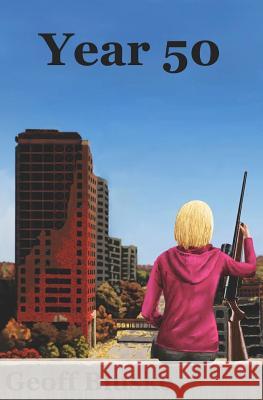Year 50 » książka
Year 50
ISBN-13: 9781463777173 / Angielski / Miękka / 2011 / 306 str.
It has been almost 50 years since the planet was nearly rid of humans. Wildlife grows without restraint, erasing the metal and concrete structures left behind. Even where industrialization was most prominent, trees and grassland are aggressively reclaiming their land; Earth is pulling away the scab of human civilization. A young woman named Calypso leads a team of Scavengers beyond the walls of Brighton, the last human colony. Her goal is to find medical supplies, necessary to preserve humanity's future. It is a dangerous journey few have the training, ability, or psychological threshold to carry out. The team's journey involves days of travel through infested city ruins, something even the most battle-hardened survivors are unwilling to do. Entering The Wild means facing Puppets, creatures which nearly exterminated humans and are now the predominant species. They are human bodies being controlled by an alien parasite, turning them to feral, ravenous creatures driven only to consume and replicate. Everyone on Calypso's team has been trained to kill these monsters from the moment they could hold a weapon. They have learned to never underestimate the alien monsters, as any mistake can bring death. But a short ways into the scavenge, the team discovers that Puppets are mutating, making them more apt predators now than ever before. Though the journey now borders on impossibility, Calypso pushes ahead, as failure by her team could mean the end of humanity. Note from the author] Year 50 was originally written as a zombie-adventure, out of love for the genre. However, there were some issues that have always been problematic for me. Most notably, the implausibility of zombies. Granted, they are fictional creatures that cannot be taken in complete seriousness; but between rigor mortis, decomposition, consumption by scavenging animals/insects, and the general ineffectiveness of the monsters, it seems impossible that a zombie outbreak would last more than 24 hours. As such, I modified the concept to create Puppets (human bodies being controlled by an alien parasite), which nullify these problems. This concept is fantastic and supernatural as well, but can operate with science and logic remaining intact. Zombie stories often deal with the initial outbreak, typically involving people focused on what the world used to be like and their ability to adapt and change. This issue is not as problematic for me as it is overdone. I am more interested in what would happen later, to people who would be born into this new world. As the title implies, Year 50 takes place 49 years after the outbreak itself, providing characters adapted to a world where zombie-like creatures are commonplace. There is no old world to remember, as they know nothing of it. As such, Year 50 is not a horror story, as monsters are a part of everyday life. Though Year 50 was written initially as a zombie story, it became more about the post-apocalyptic culture that humans would form. My studies in evolutionary biology and cultural psychology proving as useful as any English class I have taken. So while the story deals with fantastic, fictional creatures, everything in the world follows a realistic path of scientific and cultural progression. The primary characters in Year 50 are intelligent to the level of present-day geniuses, athletic to the level of Olympic athletes, and resilient to the level of battle-hardened soldiers; in all cases, because they have to be. People lacking in any of these categories have been killed off. Year 50 is ultimately for people who love post-apocalyptic science-fiction and/or zombie-driven adventure.
Zawartość książki może nie spełniać oczekiwań – reklamacje nie obejmują treści, która mogła nie być redakcyjnie ani merytorycznie opracowana.











